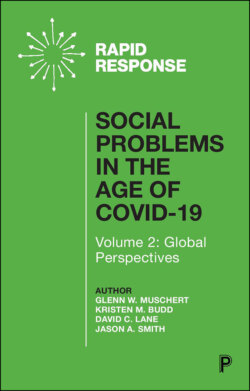Читать книгу Social Problems in the Age of COVID-19 Vol 2 - Группа авторов - Страница 23
На сайте Литреса книга снята с продажи.
Research Evidence
ОглавлениеSince the COVID-19 pandemic has been with us for less than a year, little research to date has examined its full impacts on the contemporary transition to adulthood. We know, however, that the pandemic has already delayed the acquisition of markers of adulthood. The pandemic has threatened youth’s educational achievement and will likely depress their acquisition of postsecondary degrees. A large body of research, conducted across countries, documents the critical importance of educational attainment for adult occupational status and income. UNESCO estimates that school closures took place in more than 180 countries, affecting 90 percent of the world student population at all levels of the education system, including colleges, universities, and postsecondary technical/vocational programs. With the advent of remote instruction, many disadvantaged students in both high-income and developing countries found themselves on the wrong side of a digital divide, threatening their ability to complete their educations. The digital divide may also increase educational gaps between low- and high-income countries, considering their unequal ability to provide training and guidance for teachers and quality instruction for students.
With respect to employment, the International Labour Organization estimates that more than one in six young people lost their jobs during the pandemic, and those with jobs had their hours reduced by almost 25 percent. In many countries, initial restrictions shut down major industries (eg restaurants and hospitality, the retail sector) that typically employ large numbers of young people. Job losses among young Europeans were three times higher than among older adults, and in countries like Spain and Greece, where youth unemployment has remained at over 30 percent since the Great Recession, it is estimated that the pandemic could drive unemployment over 35 percent. In the US, the youth unemployment rate more than doubled between January 2020 (11.7 percent) and April 2020 (25.5 percent). In China, with millions of new college graduates entering the labor market each year, approximately 14 percent of youth labor force participants were out of work during the pandemic. As most countries try to reopen their economies, youth unemployment rates tend to improve at least slightly, but many young workers will experience longer-term unemployment. Inability to work during this critical life stage hampers opportunities for skill development and the accumulation of work experience, thereby also threatening successful adult occupational careers.
The COVID-19 pandemic has also reduced the capacity of young people to achieve family-related transition markers. It has disrupted the process of leaving home, as many youth, having achieved some degree of independent residence, were forced to return to their families of origin. In fact, data from the Current Population Survey shows that an unprecedented number of young people moved back home in 2020 in the US. When the pandemic hit, college students had to move out of their dorms or off-campus housing, and youth employed in non-essential businesses, having lost their source of income, became unable to pay their rents. Youth whose romantic partners were not co-resident prior to the pandemic would no longer be able to see them face-to-face without violating executive orders. Slowing or disrupting the course of romantic relationships would possibly delay cohabitation, marriage, and parenthood. As previous research shows, delay in family-related transitions interferes with adult identity formation and fosters feelings of being “off time” in acquiring markers of adulthood. Thus, those who perceive themselves as “late” with respect to family-related markers have difficulty thinking of themselves as adults. Taking on an adult identity is linked to the enactment of pro-social behaviors associated with adult status, such as voting and volunteering; those who engage in adolescent-like “risky,” deviant, and unlawful behaviors feel less like adults.
